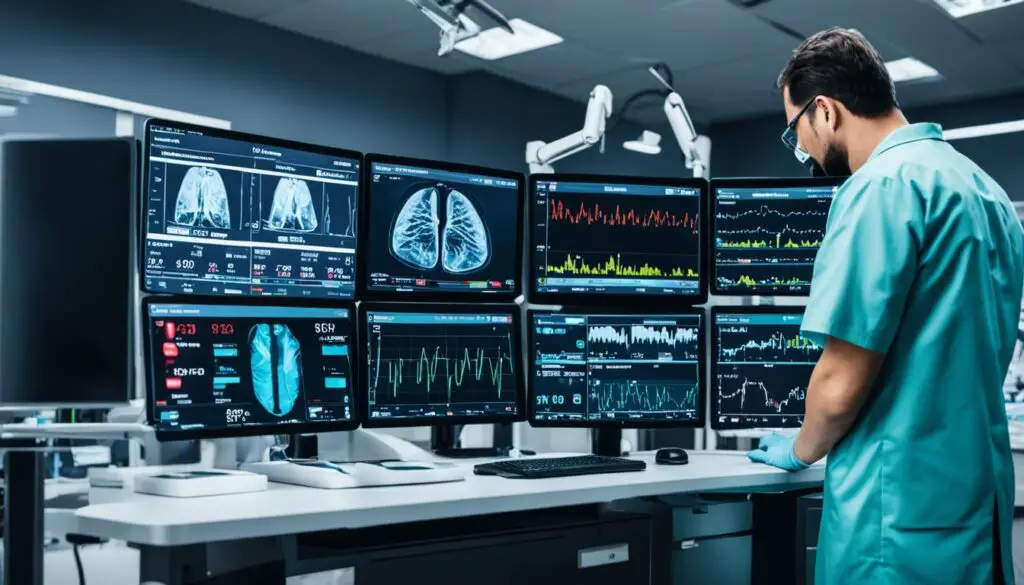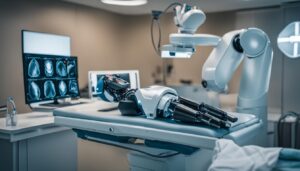
Artificial intelligence (AI) is revolutionizing the field of emergency healthcare response. With its ability to make rapid, data-driven decisions, AI is transforming how healthcare professionals provide efficient and effective treatment in emergency situations. From enhancing emergency response to revolutionizing lifesaving care, AI is playing a critical role in improving healthcare outcomes.
Key Takeaways:
- AI is revolutionizing emergency healthcare response by making rapid, data-driven decisions.
- AI is enhancing emergency response and revolutionizing lifesaving care in challenging situations.
- AI augments the expertise and judgment of healthcare professionals, rather than replacing them.
- Ethical considerations must be taken into account when leveraging AI in emergency healthcare response.
- AI has the potential to save lives and improve healthcare outcomes in remote and challenging environments.
AI in Emergency Response
In remote areas where access to medical professionals is limited, AI is proving to be a valuable tool in emergency response. AI algorithms can analyze data from wearable devices and alert emergency responders when a person’s vital signs indicate a medical emergency. This early warning system can save precious time and potentially save lives by providing critical support in situations where immediate access to medical care is not available.
In remote areas, emergency situations can be particularly challenging due to the lack of healthcare infrastructure and resources. However, with the integration of AI technology, emergency response can be significantly improved. Wearable devices equipped with sensors can collect real-time data on an individual’s vital signs, such as heart rate, blood pressure, and oxygen levels. This data is then analyzed by AI algorithms, which can quickly detect any abnormalities or signs of distress.
Once an emergency is detected, AI can automatically send alerts to emergency responders, providing them with valuable information about the individual’s condition and location. This allows responders to quickly assess the situation and provide appropriate medical assistance, even in remote areas where access to healthcare facilities is limited.
The use of AI in emergency response also extends to disaster situations, where early warning systems are crucial in saving lives. AI algorithms can analyze data from various sources, such as seismic sensors and weather stations, to detect potential hazards and issue early warnings. This enables authorities to take proactive measures and evacuate residents from affected areas, minimizing the impact of disasters.
Using AI in emergency response is a game-changer, especially in remote areas with limited medical resources. The ability to analyze real-time data from wearable devices and provide early warnings can significantly improve emergency healthcare outcomes and save lives.
Furthermore, AI can assist emergency responders in triaging patients and allocating resources efficiently. By analyzing data on the severity of injuries or illnesses, AI algorithms can prioritize patients based on their medical needs. This ensures that those in critical condition receive immediate attention, while those with less severe conditions are managed accordingly.
In addition to improving emergency response in remote areas, AI technology also brings significant advancements in telemedicine. Through AI-powered virtual consultations, medical professionals can remotely assess patients and provide crucial guidance in emergency situations. This not only enables faster access to medical expertise but also reduces the need for individuals in remote areas to travel long distances for urgent medical care.
The Role of Wearable Devices in AI-Enabled Emergency Response
Wearable devices play a vital role in AI-enabled emergency response. These devices, such as smartwatches and biosensors, can continuously monitor a person’s vital signs and provide real-time data to AI algorithms. This enables emergency responders to receive timely alerts and make informed decisions based on the individual’s health status.
For example, in the case of a heart attack, wearable devices can detect abnormal heart rhythms and send immediate alerts to emergency responders. This allows for early intervention and improves the chances of a positive outcome for the patient.
Overall, AI has the potential to revolutionize emergency response in remote areas by providing early warnings, optimizing resource allocation, and enabling telemedicine. As the technology continues to advance, AI-driven solutions in emergency healthcare will become even more effective, ensuring that individuals in remote and underserved areas receive timely and lifesaving interventions.
AI in Diagnosis and Treatment
When it comes to diagnosing and treating medical conditions in extreme situations, AI technology is proving to be a valuable asset. In areas where access to specialized medical professionals is limited, AI algorithms can analyze symptoms and medical history to provide accurate diagnoses. This becomes particularly crucial in remote locations where medical expertise may be scarce. By leveraging AI, healthcare professionals can offer the best possible care, even in challenging circumstances.
One of the significant advantages of AI in diagnosis is its ability to process vast amounts of data quickly. This enables AI algorithms to consider a wide range of potential medical conditions and provide accurate assessments. By analyzing symptoms and cross-referencing them with known medical conditions, AI can offer valuable insights into the possible diagnoses, guiding healthcare professionals in providing appropriate treatment.
Moreover, AI’s role in treatment goes beyond diagnosis. With its ability to assess medical conditions and take into account available resources, AI can suggest suitable treatment options. This is particularly valuable in situations where specialized medical professionals are not readily available or where resources may be limited. By leveraging AI’s data-driven recommendations, healthcare professionals can ensure that patients receive the best possible care, even in challenging circumstances.
“AI technology enhances the diagnostic and treatment process, providing accurate assessments and guiding healthcare professionals in delivering optimal care, even in remote and resource-strained settings.”
AI in Medical Decisions: Advantages and Considerations
By utilizing AI in the diagnosis and treatment process, medical professionals can benefit from:
- Accurate and efficient diagnoses, even in remote areas with limited access to specialized medical professionals.
- Data-driven treatment recommendations based on available resources and patient condition.
- Improved efficiency and speed in diagnosing and treating medical conditions.
However, it’s essential to consider some limitations and ethical considerations when leveraging AI in diagnosing and treating medical conditions. While AI can assist in providing accurate assessments, its recommendations should always be complemented by medical professionals’ expertise and judgment. Additionally, privacy and data security must be prioritized to protect patient information when utilizing AI technology.
| Advantages of AI in Diagnosis and Treatment | Considerations when Using AI in Medical Decision-Making |
|---|---|
|
|
With its ability to enhance the diagnostic and treatment process, AI technology is revolutionizing how medical conditions are diagnosed and treated, even in the most challenging circumstances. By leveraging AI’s capabilities and collaborating with specialized medical professionals, healthcare providers can ensure optimal care for patients across the globe.

AI in Monitoring Chronic Conditions
AI is playing a crucial role in monitoring chronic conditions, especially in remote areas where access to healthcare resources may be limited. In the context of wilderness medicine, AI-powered devices enable continuous monitoring of individuals with chronic illnesses, ensuring their well-being while exploring remote and challenging environments.
Through continuous monitoring, AI provides real-time feedback to patients, allowing them to manage their conditions effectively. For example, individuals with diabetes can benefit from AI’s analysis of data from glucose monitors. AI algorithms can provide personalized recommendations on diet and exercise, empowering patients to make informed decisions about their activities and ensuring their safety during wilderness adventures.
The ability of AI to provide real-time feedback is particularly valuable in scenarios where immediate access to medical professionals may not be available. By leveraging AI technology, patients with chronic conditions can receive timely guidance and support, even in remote areas. This continuous monitoring and real-time feedback enhance patient autonomy and enable them to proactively manage their health in challenging environments.
For healthcare professionals in wilderness medicine, AI in monitoring chronic conditions offers valuable insights. The data collected and analyzed by AI-powered devices provide an additional layer of information that can inform medical decisions and interventions. This data-driven approach, combined with the expertise of healthcare professionals, enhances the quality of care provided in extreme conditions.

“The integration of AI in chronic condition monitoring allows us to bridge the gap in healthcare accessibility, especially in remote areas. This technology empowers patients to take control of their health, and it provides healthcare professionals with valuable data to guide their decisions in challenging environments.”
AI in Training Healthcare Professionals
AI is redefining the way healthcare professionals are trained in the field of wilderness medicine. By harnessing the power of AI, simulations are created to provide realistic scenarios, enabling healthcare professionals to practice their skills in a controlled environment.
Simulations, powered by AI algorithms, adapt based on the trainee’s performance, offering personalized feedback to enhance their skills and proficiency. This tailored feedback plays a crucial role in preparing healthcare professionals to handle the unique challenges they may encounter in extreme conditions.
With AI-enabled simulations, healthcare professionals can:
- Develop critical thinking skills
- Enhance their decision-making abilities
- Improve their response time
- Practice effective communication
Through immersive training experiences, healthcare professionals gain valuable hands-on experience and build confidence in their abilities to provide high-quality care, even in the most challenging and remote settings.
By incorporating AI into training programs, healthcare professionals can better adapt and respond to unpredictable situations they may encounter in wilderness medicine. AI-powered simulations contribute to the continuous development and refinement of their skills, ensuring optimal patient care in emergency scenarios.
Benefits of AI in Healthcare Training
The integration of AI in training healthcare professionals offers numerous benefits:
“AI-powered simulations provide a safe and controlled environment for healthcare professionals to gain experience and refine their skills, ultimately leading to improved patient outcomes.”
| Benefit | Description |
|---|---|
| Realistic Scenarios | AI-powered simulations create lifelike scenarios that mimic the challenges encountered in wilderness medicine, offering valuable training experiences. |
| Personalized Feedback | AI algorithms analyze trainees’ performance and provide personalized feedback to enhance their skills and address areas for improvement. |
| Enhanced Decision-making | Simulations with AI integration improve trainees’ critical thinking and decision-making abilities by presenting them with dynamic scenarios and varying levels of urgency. |
| Improved Collaboration | AI-powered simulations can facilitate collaborative training exercises, enabling healthcare professionals to practice teamwork and effective communication in emergency situations. |
With AI-driven training, healthcare professionals possess the knowledge, skills, and confidence necessary to deliver exceptional care in challenging and remote environments.
Limitations of AI in Emergency Response Healthcare
While AI is transforming emergency response healthcare, it is important to acknowledge its limitations. AI should never replace the expertise and judgment of healthcare professionals but should be seen as a powerful tool that complements their skills. Ethical considerations must also be taken into account when using AI in wilderness medicine, prioritizing privacy and data security to protect patient information.
Complementing Healthcare Professionals
AI in emergency response healthcare is designed to support and enhance the capabilities of healthcare professionals rather than replace them. While AI algorithms can analyze data and provide valuable insights, they still require the interpretation and clinical expertise of healthcare professionals to make informed decisions. The human touch and experience are invaluable in emergency situations, where rapid decision-making is crucial for patient outcomes.
Ethical Considerations
Integrating AI into wilderness medicine raises important ethical considerations. Healthcare professionals must prioritize patient privacy and data security when using AI-powered technologies. Strict safeguards should be implemented to protect patient information, ensuring that data is stored securely and accessed only by authorized individuals. Additionally, healthcare professionals must adhere to ethical guidelines and standards to ensure the responsible and ethical use of AI in emergency response healthcare.
“AI in emergency response healthcare is designed to support and enhance the capabilities of healthcare professionals rather than replace them.”
By recognizing the limitations of AI and addressing the ethical considerations, healthcare professionals can effectively harness the power of AI in wilderness medicine. AI has the potential to significantly improve emergency response, diagnosis, and treatment outcomes in challenging environments. However, it is crucial to maintain a balance between AI’s capabilities and the expertise of healthcare professionals to provide optimal care to patients in emergency situations.
| Limitations of AI in Emergency Response Healthcare | Complementing Healthcare Professionals | Ethical Considerations |
|---|---|---|
| Should not replace expertise and judgment of healthcare professionals | AI supports and enhances the skills of healthcare professionals | Prioritize patient privacy and data security |
| Requires interpretation and clinical expertise of healthcare professionals | Human touch and experience are crucial in making informed decisions | Implement safeguards to protect patient information |
| Adhere to ethical guidelines and standards | Balance AI capabilities with healthcare professionals’ expertise | Ensure responsible and ethical use of AI in emergency response healthcare |
AI’s Impact on Wilderness Medicine
When it comes to wilderness medicine, AI is making a profound impact on emergency response, diagnosis, treatment, monitoring, and healthcare professional training. By harnessing the power of AI, healthcare professionals can provide better care even in the most challenging and remote environments.
Enhancing Emergency Response
AI plays a vital role in enhancing emergency response in wilderness medicine. With its ability to process vast amounts of data quickly, AI algorithms can analyze critical information and provide healthcare professionals with real-time insights. This enables them to make informed decisions and act swiftly, potentially saving lives. Whether it’s detecting early warning signs, monitoring patient vitals, or predicting possible complications, AI empowers emergency response teams to deliver effective care when every second counts.
Improving Diagnosis and Treatment
Diagnosing and treating medical conditions in remote areas can be challenging, but AI is changing the game. AI algorithms can analyze symptoms, medical history, and even remotely collected data to assist healthcare professionals in making accurate diagnoses and implementing appropriate treatment plans. This is particularly valuable in situations where access to specialized medical professionals is limited. By leveraging AI, healthcare providers can improve the quality of care and ensure that patients receive timely and effective treatment.
Monitoring and Managing Chronic Conditions
For individuals exploring remote areas with chronic conditions, AI offers valuable support. AI-powered devices can continuously monitor patients’ health, providing real-time feedback and alerts when intervention is needed. This enables individuals to manage their conditions effectively, make informed decisions about their activities, and seek medical assistance promptly if necessary. AI empowers patients to take control of their health, even in the wilderness.
Training Healthcare Professionals for Wilderness Medicine
Preparing healthcare professionals for the unique challenges of wilderness medicine requires advanced training. AI comes into play here as well. Through simulations powered by AI, healthcare professionals can practice their skills in realistic scenarios. These simulations adapt to the trainee’s performance, providing personalized feedback and enabling professionals to hone their abilities. By integrating AI into training programs, healthcare professionals are better equipped to handle emergencies, make critical decisions, and deliver effective care in extreme conditions.
| AI’s Impact on Wilderness Medicine | Benefits |
|---|---|
| Enhancing Emergency Response | Providing critical support in remote areas Enabling rapid decision-making based on real-time insights |
| Improving Diagnosis and Treatment | Assisting in accurate diagnoses Facilitating appropriate treatment plans in limited-resource settings |
| Monitoring and Managing Chronic Conditions | Continuous real-time monitoring Empowering individuals with chronic conditions |
| Training Healthcare Professionals | Realistic simulations for skill development Personalized feedback and performance improvement |
In conclusion, AI’s impact on wilderness medicine is undeniable. It revolutionizes emergency response, improves diagnosis and treatment, enhances chronic condition management, and prepares healthcare professionals to navigate the challenges of remote environments. By leveraging AI in wilderness medicine, we can save lives, improve healthcare outcomes, and deliver efficient and effective care, regardless of the circumstances.
Conclusion
In conclusion, AI is revolutionizing emergency response healthcare in remote and challenging environments. With its remarkable ability to process vast amounts of data and make rapid decisions, AI is transforming how healthcare professionals provide efficient and effective treatment. Whether it’s enhancing emergency response or improving diagnoses and treatment, AI is truly a lifesaving technology that has the potential to revolutionize care even in the most demanding circumstances.
By leveraging AI, healthcare professionals can overcome many of the obstacles faced in remote areas where access to medical expertise is limited. AI algorithms can analyze data from wearable devices, acting as an early warning system to alert emergency responders when a person’s vital signs indicate a medical emergency. This invaluable technology saves precious time and potentially saves lives by providing critical support in situations where immediate access to medical care is not available.
Furthermore, AI assists healthcare professionals in diagnosing and treating medical conditions even in extreme conditions. In remote areas where specialized medical expertise may be scarce, AI algorithms can analyze symptoms and medical history to provide accurate diagnoses. This empowers healthcare professionals to deliver the best possible care, ensuring that patients receive appropriate treatment options based on available resources and their specific condition.
Additionally, AI plays a vital role in monitoring chronic conditions in wilderness medicine. AI-powered devices continuously monitor the health of individuals with chronic illnesses, providing real-time feedback and enabling patients to manage their conditions effectively. By analyzing data from glucose monitors, for example, AI can suggest personalized recommendations on diet and exercise for individuals with diabetes, promoting their safety during wilderness adventures.
Ultimately, AI is not designed to replace the knowledge and expertise of healthcare professionals but rather to complement their skills. Ethical considerations, such as prioritizing privacy and data security, must be taken into account when using AI in wilderness medicine to protect patient information. With the right approach, AI has the remarkable potential to save lives and improve healthcare outcomes in emergency situations, revolutionizing care in even the most challenging circumstances.
FAQ
How is AI revolutionizing emergency healthcare response?
AI is revolutionizing emergency healthcare response by providing efficient and effective treatment through rapid data-driven decisions.
How does AI enhance emergency response in remote areas?
AI enhances emergency response in remote areas by analyzing data from wearable devices and alerting emergency responders when vital signs indicate a medical emergency.
In what ways does AI assist in diagnosing and treating medical conditions?
AI assists in diagnosing and treating medical conditions by analyzing symptoms and medical history to provide accurate diagnoses, especially in situations where specialized medical professionals may be limited.
How does AI play a role in monitoring chronic conditions in wilderness medicine?
AI plays a role in monitoring chronic conditions in wilderness medicine by continuously analyzing data from AI-powered devices, providing real-time feedback to individuals exploring remote areas.
How does AI aid in training healthcare professionals in wilderness medicine?
AI aids in training healthcare professionals in wilderness medicine by providing realistic simulations and personalized feedback, allowing professionals to practice their skills in a controlled environment.
Is AI a replacement for healthcare professionals in emergency response healthcare?
No, AI should never replace the expertise and judgment of healthcare professionals, but should rather be seen as a powerful tool that complements their skills.
What are the limitations of AI in emergency response healthcare?
The limitations of AI in emergency response healthcare include the need for ethical considerations, prioritizing privacy and data security to protect patient information.
What is the impact of AI on wilderness medicine?
AI has a significant impact on wilderness medicine by enhancing emergency response, improving diagnosis and treatment, monitoring chronic conditions, and aiding in the training of healthcare professionals.
Source Links
- https://anyuakmedia.com/the-role-of-ai-in-wilderness-medicine-enhancing-emergency-response-and-care/
- https://www.cbsnews.com/minnesota/news/watch-live-officials-provide-update-in-cloquet-shooting-that-left-suspect-2-others-dead/
- https://tiresandparts.net/news/parts/valeo-and-teledyne-flir-announce-agreement-and-first-contract-for-thermal-imaging-for-automotive-safety-systems/








